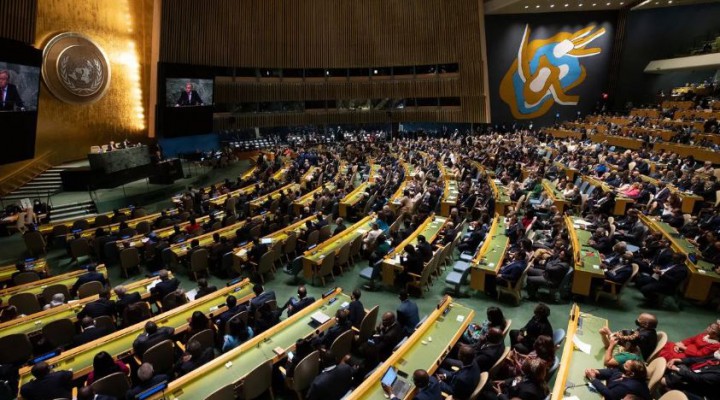The UN’s ‘shared goal’ excludes the Palestinians

What the Palestinian people want is far removed from what is being decided by governments and UN officials. As the Arab League held its first summit, in Algiers, since the signing of the Abraham Accords, Arab leaders reaffirmed their “commitment” to the Palestinian “cause”. Such vague language was necessary, because mentioning anti-colonial resistance does not match the diplomatic tone required of the normalisation agreements which some Arab countries have signed with Israel.
“Our main and first cause, the mother of all causes, the Palestinian issue, will be at the heart of our concerns and our main priority,” said Algerian President Abdelmajid Tebboune. Given that the Arab League still follows two-state politics, now subject to the Abraham Accords as even global leaders are inferring, Palestinians will need much more than grand rhetoric — even if it does make headlines — if they want some form of action. Upholding the two-state paradigm facilitates Israel’s colonial expansion, in which case Arab complicity can be called out for failing one of their own. Al Jazeera‘s reporter Zeina Khodr summed up the tactic thus: “We heard leaders express support for the Palestinians and their right to statehood, but no condemnation of Israel.”
UN Secretary General Antonio Guterres, therefore, faces no opposition from Arab countries and their support for Israel. The two-state compromise remains a unifying factor for the international community but not for the Palestinians, apart from the Palestinian Authority. In yet another display of how Palestinians don’t matter when it comes to their political demands, Guterres’s address to the Arab summit reaffirmed the defunct paradigm: “Our shared goal remains two States – Israel and Palestine – living side by side in peace and security, with Al-Quds/Jerusalem as the capital of both states.”
Even as UN Special Coordinator for the Middle East Peace Process Tor Wennesland stated that 2022 is “on course to be the deadliest year for Palestinians in the West Bank” since 2005, when the UN Office for Coordination of Humanitarian Affairs started keeping track of Palestinians killed by Israel, Guterres and Arab leaders have dissociated the violence from the two-state “solution”. They have removed from the Palestinians their right to be involved in a political process that should start with, and maintain, the decolonisation of their land, and security for the people of occupied Palestine.
When Guterres says “our shared goal”, he excludes everything Palestinian. The Palestinian people’s history, their narratives, their anticolonial resistance, their right to a democratically elected government and above all, their right to their territory, are not part of the two-state narrative pushed by the UN and which the international community demands that the Palestinians should abide by.
How exactly does the reaffirmation of support for a failed political imposition help Palestinians? The Arab League is on the same page as the rest of the international community, but definitely not on the side of legitimate anti-colonial resistance against Israel’s colonial presence on Palestinian land. Likewise, Guterres only speaks to tell Palestinians that whatever becomes of Palestine is a shared international aspiration, and one that emulates Israel’s colonial demands. That the PA is incapable of denouncing such treachery – indeed, that it participates willingly in the charade – is all the more reason why Palestinians should have the space to express their legitimate political demands and the opportunity to fulfil them.
https://www.middleeastmonitor.com/20221103-the-uns-shared-goal-excludes-the-palestinians/
 TheAltWorld
TheAltWorld 
0 thoughts on “The UN’s ‘shared goal’ excludes the Palestinians”